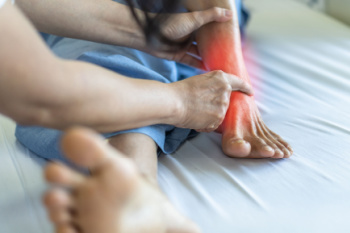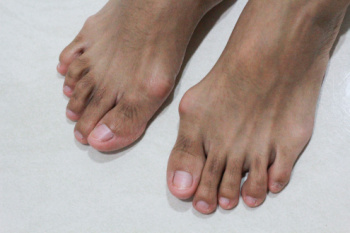
Tarsal tunnel syndrome is a condition affecting the tibial nerve as it passes through the tarsal tunnel, located on the inside of the ankle. It primarily affects individuals who engage in repetitive activities or have deformities, such as flat feet. The syndrome occurs when the nerve becomes compressed, leading to symptoms like tingling, burning sensations, numbness, or shooting pain along the inner ankle and sole of the foot. Diagnosis generally involves a physical examination, medical history review, and possibly nerve conduction studies or imaging tests to confirm the compression. If you have symptoms of tarsal tunnel syndrome, it is suggested that you schedule an appointment with a podiatrist for a proper diagnosis and treatment. This type of healthcare professional can help you manage the condition by suggesting conservative treatments first. In severe cases, surgical intervention may be necessary to relieve pressure on the nerve and alleviate symptoms, restoring comfort and function to the affected foot.
Tarsal tunnel syndrome can be very uncomfortable to live with. If you are experiencing tarsal tunnel syndrome, contact Kentston Cripe, DPM of Roseville Foot & Ankle. Our doctor can provide the care you need to keep you pain-free and on your feet.
Tarsal Tunnel Syndrome
Tarsal tunnel syndrome, which can also be called tibial nerve dysfunction, is an uncommon condition of misfiring peripheral nerves in the foot. The tibial nerve is the peripheral nerve in the leg responsible for sensation and movement of the foot and calf muscles. In tarsal tunnel syndrome, the tibial nerve is damaged, causing problems with movement and feeling in the foot of the affected leg.
Common Cause of Tarsal Tunnel Syndrome
- Involves pressure or an injury, direct pressure on the tibial nerve for an extended period of time, sometimes caused by other body structures close by or near the knee.
- Diseases that damage nerves, including diabetes, may cause tarsal tunnel syndrome.
- At times, tarsal tunnel syndrome can appear without an obvious cause in some cases.
The Effects of Tarsal Tunnel Syndrome
- Different sensations, an afflicted person may experience pain, tingling, burning or other unusual sensations in the foot of the affected leg.
- The foot muscles, toes and ankle become weaker, and curling your toes or flexing your foot can become difficult.
- If condition worsens, infections and ulcers may develop on the foot that is experiencing the syndrome.
A physical exam of the leg can help identify the presence of tarsal tunnel syndrome. Medical tests, such as a nerve biopsy, are also used to diagnose the condition. Patients may receive physical therapy and prescriptive medication. In extreme cases, some may require surgery.
If you have any questions please feel free to contact our office located in Roseville, CA . We offer the newest diagnostic and treatment technologies for all your foot and ankle needs.

Arthritis affecting the feet requires diligent attention to maintain overall health and mobility. Foot care for arthritic individuals involves regular inspection for inflammation, keeping feet clean and dry, and wearing supportive footwear with custom orthotic inserts. Management of inflammation and pain through medication and therapy is important to prevent long-term complications like joint deformities and reduced mobility. Particular focus should be given to maintaining foot health to prevent secondary issues. If you have arthritis that is negatively impacting the comfort of your feet, it is suggested that you make an appointment with a podiatrist for a personalized treatment plan, which may include prescribing orthotics and offering guidance on foot care techniques.
Arthritis can be a difficult condition to live with. If you are seeking treatment, contact Kentston Cripe, DPM from Roseville Foot & Ankle. Our doctor can provide the care you need to keep you pain-free and on your feet.
Arthritic Foot Care
Arthritis is a term that is commonly used to describe joint pain. The condition itself can occur to anyone of any age, race, or gender, and there are over 100 types of it. Nevertheless, arthritis is more commonly found in women compared to men, and it is also more prevalent in those who are overweight. The causes of arthritis vary depending on which type of arthritis you have. Osteoarthritis for example, is often caused by injury, while rheumatoid arthritis is caused by a misdirected immune system.
Symptoms
- Swelling
- Pain
- Stiffness
- Decreased Range of Motion
Arthritic symptoms range in severity, and they may come and go. Some symptoms stay the same for several years but could potentially get worse with time. Severe cases of arthritis can prevent its sufferers from performing daily activities and make walking difficult.
Risk Factors
- Occupation – Occupations requiring repetitive knee movements have been linked to osteoarthritis
- Obesity – Excess weight can contribute to osteoarthritis development
- Infection – Microbial agents can infect the joints and trigger arthritis
- Joint Injuries – Damage to joints may lead to osteoarthritis
- Age – Risk increases with age
- Gender –Most types are more common in women
- Genetics – Arthritis can be hereditary
If you suspect your arthritis is affecting your feet, it is crucial that you see a podiatrist immediately. Your doctor will be able to address your specific case and help you decide which treatment method is best for you.
If you have any questions, please feel free to contact our office located in Roseville, CA . We offer the newest diagnostic and treatment technologies for all your foot care needs.

If you have a bump forming at the base of your big toe or experience discomfort while wearing certain shoes, you might be dealing with a bunion. This foot deformity, medically known as hallux valgus, develops gradually due to various factors. Included are genetics, wearing tight or high-heeled footwear, rheumatoid arthritis, or Marfan's syndrome, which causes a loosening of joints. Symptoms of a bunion are a noticeable bump, pain, and redness of the big toe. Corns or calluses, limited toe movement, and a burning sensation or numbness may also occur. While initial treatment involves wearing proper footwear, more severe cases may require custom orthotics, toe spreaders, or surgery. A podiatrist can offer guidance on ways to manage symptoms, prevent further complications, and determine if surgery is needed to realign the toe and alleviate pressure on the joint. If you have a bunion that is causing pain or impeding daily activities, it is suggested that you schedule an appointment with a podiatrist for an exam and treatment options.
If you are suffering from bunions, contact Kentston Cripe, DPM of Roseville Foot & Ankle. Our doctor can provide the care you need to keep you pain-free and on your feet.
What Is a Bunion?
A bunion is formed of swollen tissue or an enlargement of boney growth, usually located at the base joint of the toe that connects to the foot. The swelling occurs due to the bones in the big toe shifting inward, which impacts the other toes of the foot. This causes the area around the base of the big toe to become inflamed and painful.
Why Do Bunions Form?
Genetics – Susceptibility to bunions are often hereditary
Stress on the feet – Poorly fitted and uncomfortable footwear that places stress on feet, such as heels, can worsen existing bunions
How Are Bunions Diagnosed?
Doctors often perform two tests – blood tests and x-rays – when trying to diagnose bunions, especially in the early stages of development. Blood tests help determine if the foot pain is being caused by something else, such as arthritis, while x-rays provide a clear picture of your bone structure to your doctor.
How Are Bunions Treated?
- Refrain from wearing heels or similar shoes that cause discomfort
- Select wider shoes that can provide more comfort and reduce pain
- Anti-inflammatory and pain management drugs
- Orthotics or foot inserts
- Surgery
If you have any questions, please feel free to contact our office located in Roseville, CA . We offer the newest diagnostic and treatment technologies for all your foot care needs.

Diabetes elevates the risk of foot complications due to nerve and blood vessel damage, underscoring the importance of regular foot exams conducted by a podiatrist. These assessments are crucial for early detection and prevention of issues that could lead to serious infections or amputations. Even minor wounds like blisters or cuts can escalate into ulcers and infections if not promptly addressed. Moreover, diabetes related vascular damage impairs blood flow to the feet, hindering the healing process and increasing the risk of tissue death, or gangrene. A comprehensive foot exam evaluates nerve function, circulation, skin condition, and musculoskeletal structure. Tests such as the monofilament and tuning fork assessments, along with vascular checks, help identify abnormalities indicative of neuropathy or reduced sensation. In addition to a yearly foot exam by a podiatrist, more frequent assessments are suggested for those with a history of foot complications. Consistent foot care and blood sugar management are also necessary for preventing diabetic foot problems. If you have diabetes and encounter foot problems, it is suggested that you schedule an appointment with a podiatrist for a complete foot exam.
Diabetic foot care is important in preventing foot ailments such as ulcers. If you are suffering from diabetes or have any other concerns about your feet, contact Kentston Cripe, DPM from Roseville Foot & Ankle. Our doctor can provide the care you need to keep you pain-free and on your feet.
Diabetic Foot Care
Diabetes affects millions of people every year. The condition can damage blood vessels in many parts of the body, especially the feet. Because of this, taking care of your feet is essential if you have diabetes, and having a podiatrist help monitor your foot health is highly recommended.
The Importance of Caring for Your Feet
- Routinely inspect your feet for bruises or sores.
- Wear socks that fit your feet comfortably.
- Wear comfortable shoes that provide adequate support.
Patients with diabetes should have their doctor monitor their blood levels, as blood sugar levels play such a huge role in diabetic care. Monitoring these levels on a regular basis is highly advised.
It is always best to inform your healthcare professional of any concerns you may have regarding your feet, especially for diabetic patients. Early treatment and routine foot examinations are keys to maintaining proper health, especially because severe complications can arise if proper treatment is not applied.
If you have any questions please feel free to contact our office located in Roseville, CA . We offer the newest diagnostic and treatment technologies for all your foot and ankle needs.
